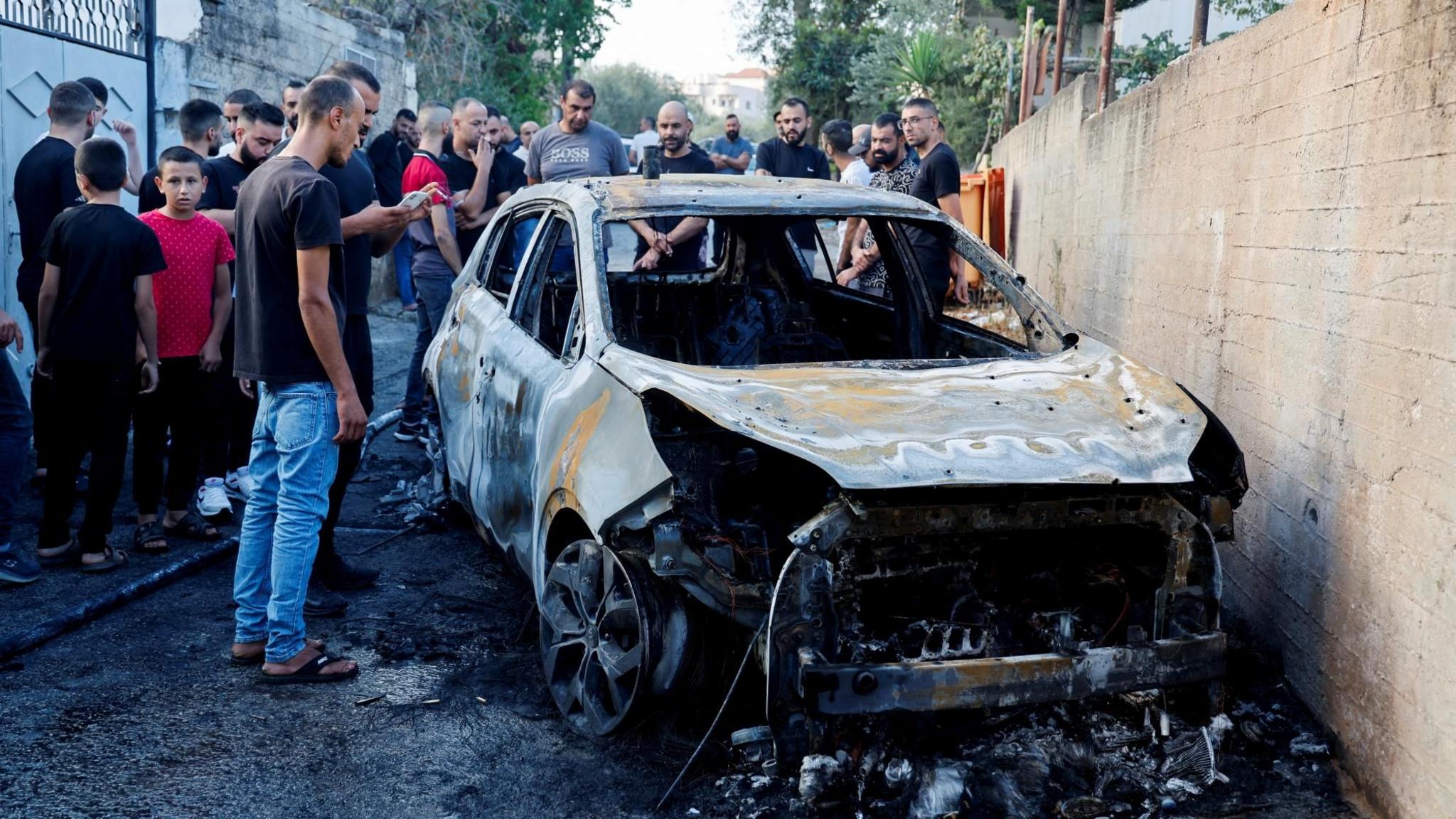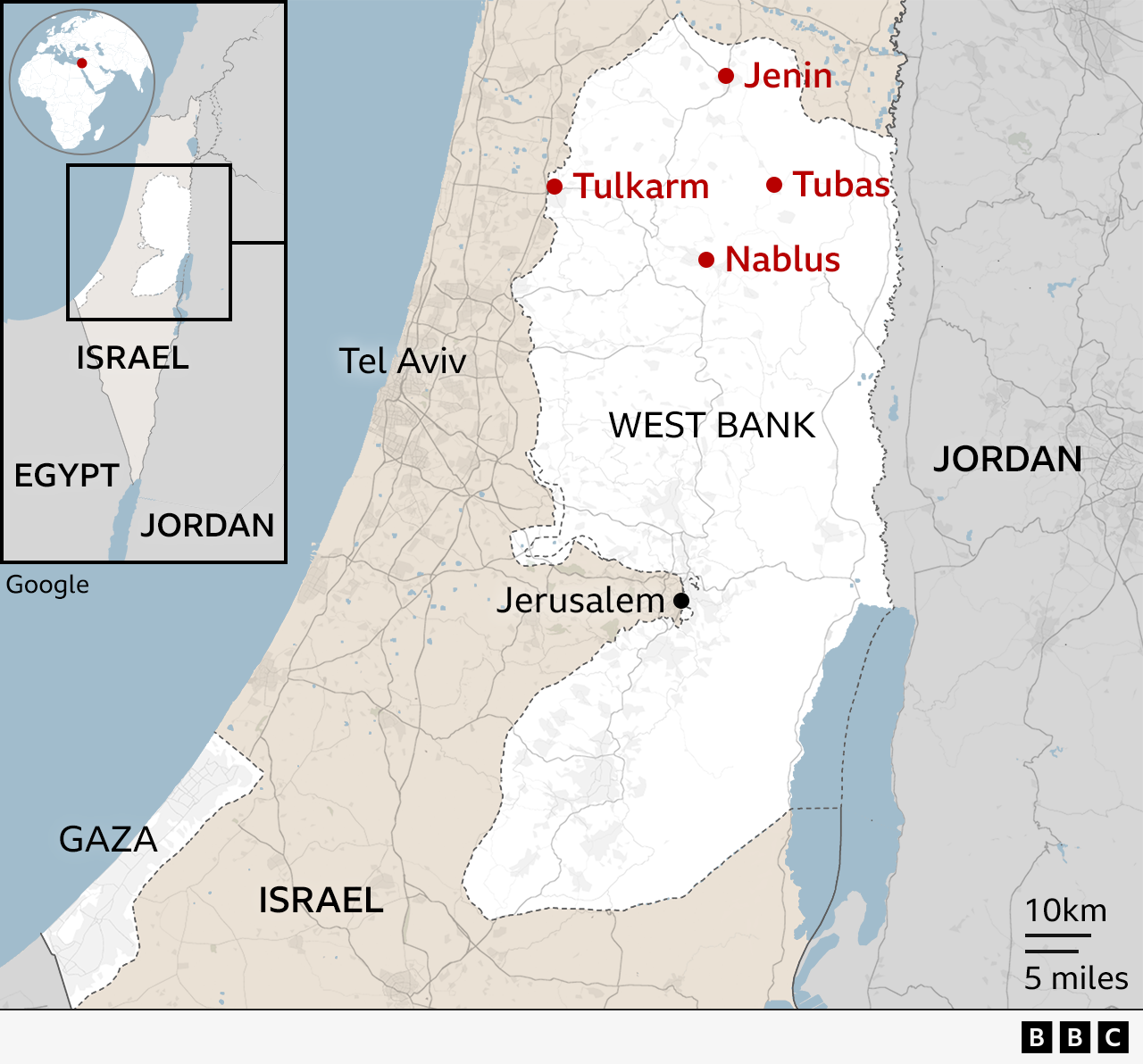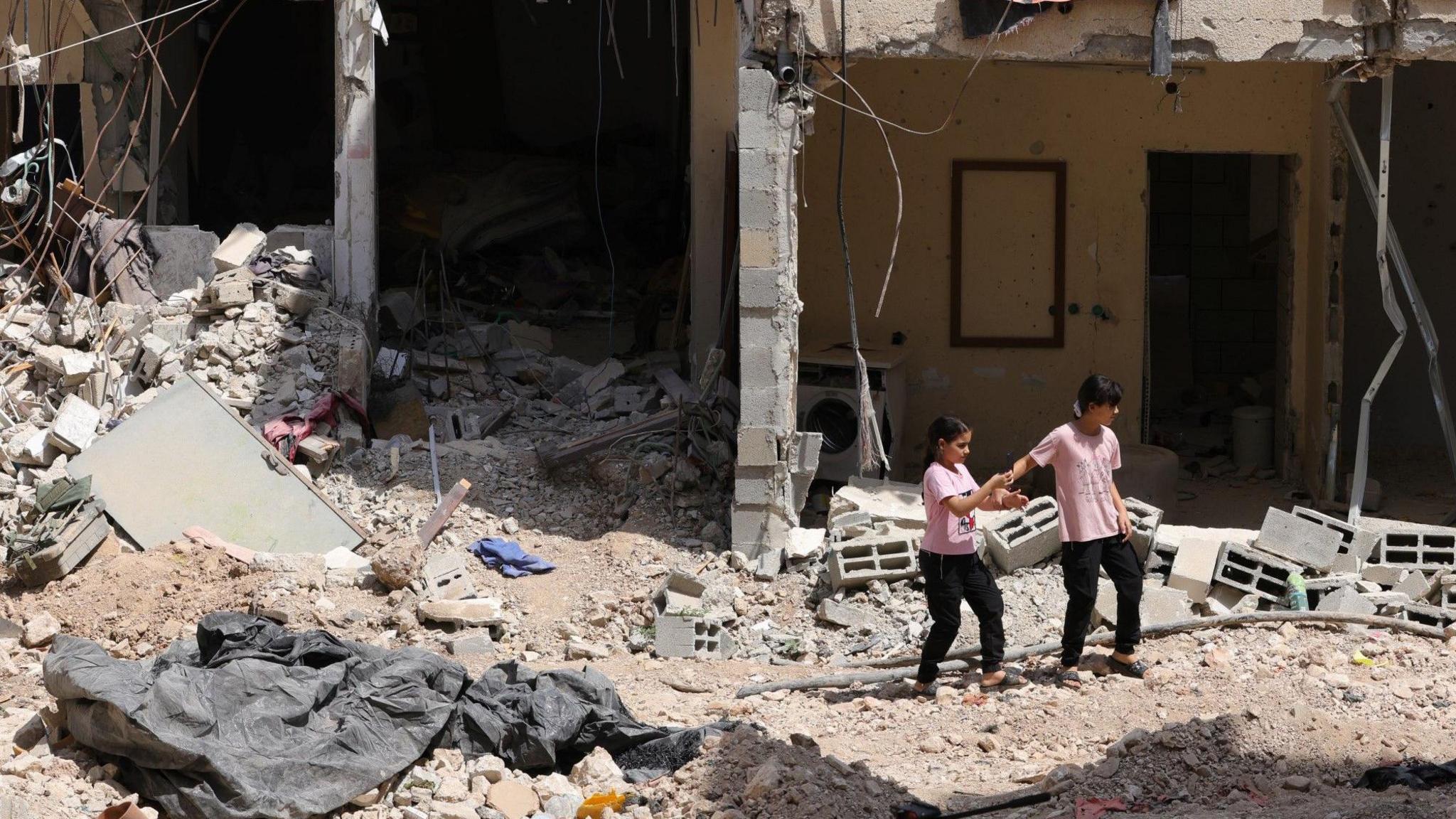Israel says Hamas leader killed on third day of West Bank operation

Palestinian health officials said the three men were killed overnight in Zababdeh, south-east of Jenin
- Published
The Israeli military says it has killed the head of the Palestinian armed group Hamas in Jenin and two other fighters, as a major operation continues for a third day in the north of the occupied West Bank.
Israeli security forces shot dead Wissam Khazem and then carried out air strikes on the other two as they attempted to flee, a statement said.
The Palestinian health ministry said the three men were killed overnight near the town of Zababdeh, south-east of Jenin. Hamas also confirmed their deaths.
The ministry said an elderly man was later killed by Israeli gunfire in Jenin itself, while Israeli forces pulled out of Tulkarm and its refugee camps.
At least 20 Palestinians have been killed since the start of the Israeli operation, which is one of the biggest in the West Bank in two decades, according to the Palestinian health ministry. Armed groups have identified most of them as fighters.
The Israeli military has said 20 "terrorists" have been killed in exchanges of fire and air strikes and 17 suspects detained during what it has described as "a precise, targeted regional operation across three terror hubs".
There has been a spike in violence in the West Bank since Hamas’s deadly attack on Israel on 7 October and the ensuing war in Gaza.
Hundreds of Palestinians have been killed as Israeli forces have intensified their raids, saying they are trying to stem deadly Palestinian attacks on Israelis in the West Bank and Israel.
Israeli West Bank raid leaves destruction and determination in its wake
- Published30 August 2024
Inside the sealed-off Jenin refugee camp targeted by IDF
- Published29 August 2024
Israeli settlers are seizing Palestinian land under cover of war - they hope permanently
- Published27 August 2024
On Friday morning, the Israel Defense Forces (IDF), Shin Bet domestic security agency and Israel Border Police put out a joint statement announcing that Wissam Khazem had been killed during an operation in the Jenin area.
It said Border Police forces had “encountered and eliminated” Khazem in a car, and accused him of carrying out and directing shooting and bombing attacks.
Shortly afterwards, it added, an IDF aircraft had “eliminated two additional terrorists while they attempted to flee from the vehicle”. It named them as Maysara Masharqa and Arafat Amer, and alleged that they had taken part in shooting attacks.
The Palestinian health ministry said the three men had been killed in Zababdeh and that their bodies had been taken away by Israeli forces.
Residents of the town found the burned-out wreck of a car riddled with bullet holes and reported that there had been two drone strikes.
Hamas’s armed wing, the Izzedine al-Qassam Brigades, confirmed that Khazem was a leader in Jenin camp and that Masharqa and Amer were members.
Israeli forces also continued their operation in Jenin itself for a third consecutive day.
Palestinian news agency Wafa cited the Palestinian Red Crescent as saying that a man from an eastern neighbourhood of the city had been shot and killed by Israeli forces on Friday night, and that the ambulance transporting his body to a local hospital had later came under fire.
Wafa identified the dead man as Tawfiq Qandil, 82.

Meanwhile, residents of Tulkarm and its refugee camps inspected the damage to homes and infrastructure following the withdrawal of Israeli forces.
A woman in Nur Shams camp, Umm Yazan, told the BBC that soldiers had laid wires from her home to blow up two of the houses opposite.
"I have 10-year-old triplets, and they trapped us in a room,” she said. "Then they started the explosions - five explosions in total. Imagine the walls shaking and your young children clinging to you. It feels like we’re in Gaza."
The Israeli military said on Thursday that it had killed “five terrorists who were hiding in a mosque”, including Mohammed Jaber, the leader of the local Tulkarm Brigade, which is affiliated with Palestinian Islamic Jihad (PIJ).
Wafa said four Palestinians had been killed during the 48-hour operation.
Jaber was buried in Nur Shams on Friday along with 69-year-old Ayed Abu Hajja, a disabled man who neighbours said was shot by a sniper when he opened a window of his house in the camp.

Israeli forces caused severe damage to homes and infrastructure in Nur Shams
Also on Thursday, the Israeli military announced that forces had pulled out of the al-Faraa refugee camp near Tubas after completing what it called “the objective of foiling terror, exposing terrorist infrastructure and eliminating armed terrorists”.
The head of the Unrwa, Philippe Lazzarini, said tens of thousands of people in four refugee camps had been affected by the raids, and that the agency had been forced to suspend services in several camps.
With the war in Gaza still raging, the Israeli operation is causing international alarm.
The UK said on Friday that while it recognised Israel’s need to defend itself against security threats, it was “deeply worried by the methods Israel has employed and by reports of civilian casualties and the destruction of civilian infrastructure".
"The risk of instability is serious and the need for de-escalation urgent," a Foreign Office spokesperson said.
The UN Secretary General, Antonio Guterres warned on Thursday that the raids were “fuelling an already explosive situation”.